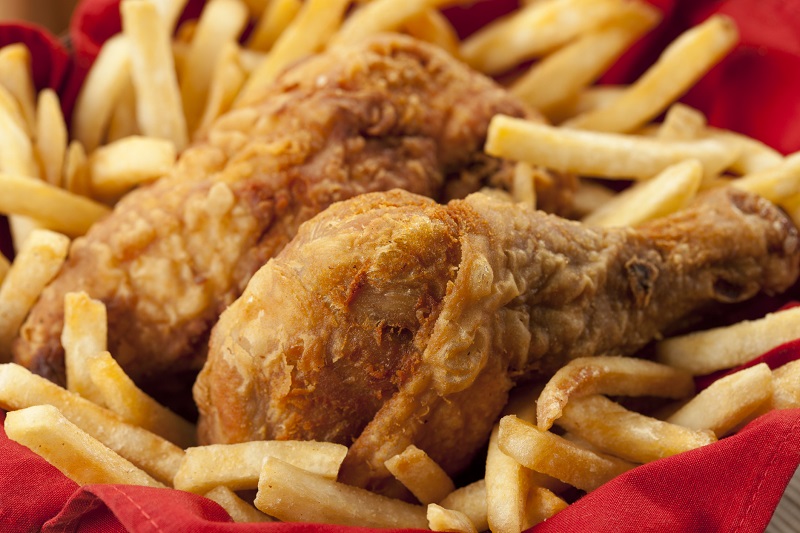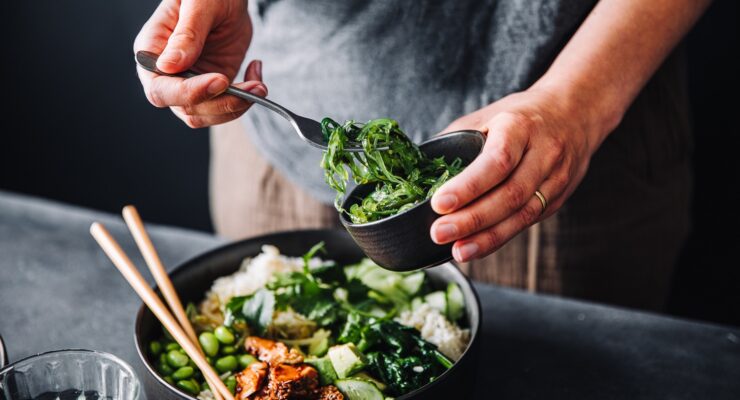The 5 Worst Foods for Gut Health
Article posted in: Diet & Nutrition
Trigger warning: This fact may make you go “eww.” The average human body is host to trillions of microorganisms that outnumber human cells 10 to one. Bacteria, viruses, fungi live with us and in us as part of a colony known as the “microbiome.”
They’re not hitchhikers or guests either. Your microbiome acts, as one team of scientists put it, “as a real organ,” performing functions that are key to your survival. Instead of saying “ew,” you might want to say “thanks!”
For example, most of our resident bacteria (in excess of 1,000 bacterial species!) live in our guts, where they provide enzymes we don’t produce ourselves to help us digest food and absorb nutrients. They also help produce beneficial substances such as vitamins and anti-inflammatory compounds that are activated by the immune system when we’re sick or injured.
Yes, the occasional bad guy sneaks in. But if we treat our guts right, the army of good bacteria we harbor can keep the bad guys at bay—and might even help us lose weight. In fact, a recent study by researchers at the University of Washington found that having certain good microbes in your gut—specifically a bacteria called Prevotella—can help you drop pounds. The overweight people in their study who had higher levels of Prevotella also had more enzymes that helped their bodies break down carbohydrates into simple sugars that they could use for energy instead of storing as fat. Consequently, they lost more weight than their counterparts with lower Prevotella levels.
Obesity is only one of the risks posed by an imbalance of gut bacteria (called “dysbiosis” in scientific studies). It’s been linked to everything from intestinal infections to diabetes, cardiovascular disease, cancer, allergies, irritable bowel syndrome, inflammatory bowel disease and kidney stones.
The best way to keep your gut bacteria healthy, happy and in balance is to eat a good diet—lots of fresh vegetables and fruit, for example—and to avoid the foods that throw them off kilter. Here are five of the worst foods for gut health that you should either take off the menu or consume sparingly.
1. Artificial Sweeteners

Synthetic sugar substitutes such as saccharin, sucralose and aspartame may seem like a dieter’s dream: You can have that chocolate bar or soda pop you’re craving without the sugar. But recent studies suggest that artificial sweeteners may alter your gut bacteria in such a way that the calories you eat are more likely to be stored as fat than used as energy.
This kind of research is in its infancy and is largely done in animals, so might not be directly translatable to humans. But most experts agree there’s enough evidence to make artificial sweeteners suspect as a dieter’s friend.
But if they do help you, you don’t have to avoid them totally. Just be judicious about how many artificial sweeteners are part of your diet. You can also opt for more natural zero-calorie sweeteners, such as stevia, monk fruit or sugar alcohols like erythritol.
2. “Junk” Food

Ultra-processed junk foods such as fast food, chips, crackers, cookies and soda came under scientific scrutiny because in populations where they’re consumed in quantity, there’s more obesity, disease, mental health issues and an increased risk of premature death. These are some of the worst foods for gut health and overall health. In one study, in fact, every additional serving of ultra-processed foods consumed raised the death rate by 18 percent!
The culprit may be the changes in gut bacteria brought on by too much “junk.” One Dutch study, which looked at the diets of more than 1,400 people, found that eating processed foods regularly killed off good bacteria, including those with anti-inflammatory properties. This lead to an overpopulation of bad bacteria in the gut. This can lay the groundwork for inflammatory bowel disease, irritable bowel syndrome and even cancer.
On the other hand, diets rich in plant food and fish promoted a healthy gut swimming with beneficial bacteria, the study found.
3. Red Meat and Energy Drinks

The same Dutch study that linked processed food to a poor gut environment also found that eating a diet high in animal foods created an inflammatory response in the gut. The kind linked to painful inflammatory bowel diseases and even life-threatening conditions such as heart attack and stroke.
Diets rich in meat protein raise the levels of a chemical called trimethylamine N-oxide (shortened to TMAO) which is produced by your gut bacteria. TMAO is linked to heart disease and may even been a warning marker for future heart attack, stroke and premature death.
A Cleveland Clinic study found that diets heavy in red meat in particular, compared to those abundant in white meat or non-meat proteins, significantly increase the amount of TMAO circulating in your body.
Another study identified a frightening result of having too much TMAO: People who had high blood levels of TMAO, which can cause heightened risk for blood clotting, had a greater risk of dying from any cause over a five-year period after the study was completed.
According to Cleveland HeartLab, “To lower your TMAO levels, consider minimizing the consumption of full-fat dairy products, including whole milk, egg yolk, cream cheese, and butter; both processed and unprocessed red meat (beef, pork, lamb, and veal), as well as nutritional supplements and energy drinks containing choline, phosphatidylcholine (lecithin), and/or L-carnitine.”
4. Fried Foods

How your food is cooked may also play a role in the health of your gut—and that’s even if you use healthier polyunsaturated oils. That’s because oil that’s been heated at high temperatures has been shown in studies to damage healthy gut microbes, including the one linked to weight loss, Prevotella.
For example, heating canola oil to fry your food lowers the amount of healthy unsaturated fatty acids it contains and increases its free fatty acids, a factor in obesity and insulin resistance, both of which can be precursors to Type 2 diabetes.
The proof is in the human subjects. In one 2021 study of 100 overweight adults published in the journal Diabetes Care, roughly half the subjects were given fried meat four times a week, while the rest were restricted from eating fried meat. At the end of the four-week study, researchers analyzed their gut bacteria and found that those who ate fried meat were more likely to have fewer varieties of beneficial bacteria and higher levels of disease-causing bacteria.
What’s more, the fried meat eaters also experienced higher inflammation levels and impaired control of their blood sugar, a marker of prediabetes and type 2 diabetes.
5. Alcohol

A wine with dinner out, a beer after work on Friday? No problem. But if you drink too much too often, you risk scrambling the delicate balance of the bacteria in your gastrointestinal tract.
Overdoing the alcohol can have other serious consequences in your digestive system. The liver and the gastrointestinal tract (including gut bacteria) work together to metabolize alcohol. Chronic alcohol consumption can cause damage to both of these, which can lead to alcoholic liver disease.
It can also cause an inflammation in the wall of your gut lining, making it more “permeable.” That means that food particles (and other things) can wind up in your bloodstream. Your body will recognize them as “alien” and mount an immune attack against them, leading to cell-damaging chronic inflammation.
If you must drink, keep it to a minimum and stick to wine, preferably red. Several studies have found that the polyphenol components in red wine—like those found in other plant foods—may have a beneficial effect on your gut bacteria. But only in moderation.






